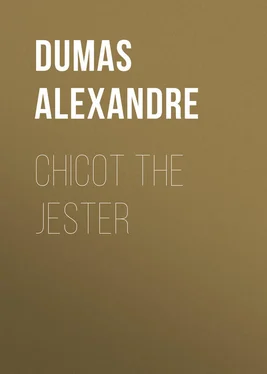Alexandre Dumas - Chicot the Jester
Здесь есть возможность читать онлайн «Alexandre Dumas - Chicot the Jester» — ознакомительный отрывок электронной книги совершенно бесплатно, а после прочтения отрывка купить полную версию. В некоторых случаях можно слушать аудио, скачать через торрент в формате fb2 и присутствует краткое содержание. Жанр: literature_19, foreign_antique, foreign_prose, на английском языке. Описание произведения, (предисловие) а так же отзывы посетителей доступны на портале библиотеки ЛибКат.
- Название:Chicot the Jester
- Автор:
- Жанр:
- Год:неизвестен
- ISBN:нет данных
- Рейтинг книги:5 / 5. Голосов: 1
-
Избранное:Добавить в избранное
- Отзывы:
-
Ваша оценка:
- 100
- 1
- 2
- 3
- 4
- 5
Chicot the Jester: краткое содержание, описание и аннотация
Предлагаем к чтению аннотацию, описание, краткое содержание или предисловие (зависит от того, что написал сам автор книги «Chicot the Jester»). Если вы не нашли необходимую информацию о книге — напишите в комментариях, мы постараемся отыскать её.
Chicot the Jester — читать онлайн ознакомительный отрывок
Ниже представлен текст книги, разбитый по страницам. Система сохранения места последней прочитанной страницы, позволяет с удобством читать онлайн бесплатно книгу «Chicot the Jester», без необходимости каждый раз заново искать на чём Вы остановились. Поставьте закладку, и сможете в любой момент перейти на страницу, на которой закончили чтение.
Интервал:
Закладка:
“Is that all I can do for you?”
“Ah, mon Dieu! I fear so.”
“Then it is done.”
“How so?”
“I guessed all this, and told your wife so.”
“And what did she say?”
“At first she would not believe; but I trust now,” continued he, glancing towards the window, “she will yield to evidence. Ask me something more difficult.”
“Then, bring here the griffin of Signor Astolfo, and let me mount en croupe, and go to my wife.”
“A more simple thing would be to take the griffin to your wife and bring her here.”
“Here!”
“Yes, here.”
“To the Louvre, that would be droll.”
“I should think so. Then you would be ennuyé no longer?”
“Ma foi! no, but if this goes on much longer, I believe I shall kill myself.”
“Well! shall I give you my page?”
“To me?”
“Yes, he is a wonderful lad.”
“Thank you, but I detest pages.”
“Bah! try him.”
“Bussy, you mock me.”
“Let me leave him.”
“No.”
“I tell you, you will like him.”
“No, no, a hundred times, no.”
“Hola, page, come here.”
Jeanne came forward, blushing.
“Oh!” cried St. Luc, recognizing her, in astonishment.
“Well! shall I send him away?”
“No, no. Ah Bussy, I owe you an eternal friendship.”
“Take care, you cannot be heard, but you can be seen.”
“It is true,” said St. Luc, retreating from his wife. Indeed, M. de Nancey was beginning to wonder what was going on, when a great noise was heard from the gallery.
“Ah! mon Dieu!” cried M. de Nancey, “there is the king quarreling with some one.”
“I really think so,” replied Bussy, affecting inquietude; “can it be with the Duc d’Anjou, who came with me?”
The captain of the guard went off in the direction of the gallery.
“Have I not managed well?” said Bussy to St. Luc.
“What is it?”
“M. d’Anjou and the king are quarrelling; I must go to them. You profit by the time to place in safety the page I have brought you; is it possible?”
“Oh, yes; luckily I declared I was ill and must keep my room.”
“In that case, adieu, madame, and remember me in your prayers.” And Bussy went off to the gallery, where the king, red with fury, swore to the duke, who was pale with anger, that in the scene of the preceding night Bussy was the aggressor.
“I affirm to you, sire,” cried the duke, “that D’Epernon, Schomberg and Quelus were waiting for him at the Hôtel des Tournelles.”
“Who told you so?”
“I saw them with my own eyes.”
“In that darkness! The night was pitch dark.”
“I knew their voices.”
“They spoke to you?”
“They did more, they took me for Bussy, and attacked me.”
“You?”
“Yes, I.”
“And what were you doing there?”
“What does that matter to you?”
“I wish to know; I am curious to-day.”
“I was going to Manasses.”
“A Jew?”
“You go to Ruggieri, a poisoner.”
“I go where I like: I am the king. Besides, as I said, Bussy was the aggressor.”
“Where?”
“At St. Luc’s ball.”
“Bussy provoked five men? No, no, he is brave, but he is not mad.”
“Par la mordieu! I tell you I heard him. Besides, he has wounded Schomberg in the thigh, D’Epernon in the arm, and half killed Quelus.”
“Ah! really I did not know; I compliment him on it.”
“I will make example of this brawler.”
“And I, whom your friends attack, in his person and in my own, will know if I am your brother, and if – ”
At this moment Bussy, dressed in pale-green satin, entered the room.
“Sire!” said he, “receive my humble respects.”
“Pardieu! here he is,” cried Henri.
“Your majesty, it seems, was doing me the honor of speaking of me.”
“Yes, and I am glad to see that, in spite of what they told me, your look shows good health.”
“Sire, blood drawn improves the complexion, so mine ought to be good this morning.”
“Well, since they have wounded you, complain, and I will do you justice.”
“I complain of nothing, sire.”
Henri looked astonished. “What did you say?” said he to the duke.
“I said that Bussy had received a wound in his side.”
“Is it true, Bussy?”
“The first prince of the blood would not lie, sire.”
“And yet you do not complain?”
“I shall never complain, sire, until they cut off my right-hand, and prevent my revenging myself, and then I will try to do it with the left.”
“Insolent,” murmured Henri.
“Sire,” said the duke, “do justice; we ask no better. Order an inquiry, name judges, and let it be proved who prepared the ambush and the intended murder.”
Henri reddened. “No,” said he, “I prefer this time to be ignorant where the wrong lies, and to pardon everyone. I wish these enemies to make peace, and I am sorry that Schomberg and D’Epernon are kept at home by their wounds. Say, M. d’Anjou, which do you call the most forward to fight of all my friends, as you say you saw them?”
“Sire, it was Quelus.”
“Ma foi! yes,” said Quelus, “his highness is right.”
“Then,” said Henri, “let MM. Bussy and Quelus make peace in the name of all.”
“Oh! Oh!” said Quelus, “what does that mean, sire?”
“It means that you are to embrace here, before me.” Quelus frowned.
“Ah, signor,” cried Bussy, imitating a pantaloon, “will you not do me this favor?”
Even the king laughed. Then, approaching Quelus, Bussy threw his arms round his neck, saying, “The king wishes it.”
“I hope it engages us to nothing,” whispered Quelus.
“Be easy,” answered Bussy, “we will meet soon.”
Quelus drew back in a rage, and Bussy, making a pirouette, went out of the gallery.
CHAPTER VI.
LE PETIT COUCHER OF HENRI III
After this scene, beginning in tragedy and ending in comedy, the king, still angry, went to his room, followed by Chicot, who asked for his supper.
“I am not hungry,” said the king.
“It is possible, but I am.”
The king did not seem to hear. He unclasped his cloak, took off his cap, and, advancing to the passage which led to St. Luc’s room, said to Chicot, “Wait here for me till I return.”
“Oh! do not be in a hurry,” said Chicot. No sooner was the king gone, than Chicot opened the door and called “Hola!”
A valet came. “The king has changed his mind,” said Chicot, “he wishes a good supper here for himself and St. Luc, above all, plenty of wine, and despatch.”
The valet went to execute the orders, which he believed to be the king’s. Henri meanwhile had passed into St. Luc’s room. He found him in bed, having prayers read to him by an old servant who had followed him to the Louvre, and shared his captivity. In a corner, on an armchair, his head buried in his hands, slept the page.
“Who is that young man?” asked the king.
“Did not your majesty authorize me to send for a page.”
“Yes, doubtless.”
“Well, I have profited by it.”
“Oh!”
“Does your majesty repent of having allowed me this little indulgence?”
“No, no, on the contrary, amuse yourself, my son. How are you?”
“Sire, I have a fever.”
“Really, your face is red; let me feel your pulse, I am half a doctor.”
St. Luc held out his hand with visible ill-humor.
“Oh!” said the king, “intermittent – agitated.”
“Yes, sire, I am very ill.”
“I will send you my doctor.”
“Thank you, sire, but I hate Miron.”
“I will watch you myself. You shall have a bed in my room, and we will talk all night.”
Читать дальшеИнтервал:
Закладка:
Похожие книги на «Chicot the Jester»
Представляем Вашему вниманию похожие книги на «Chicot the Jester» списком для выбора. Мы отобрали схожую по названию и смыслу литературу в надежде предоставить читателям больше вариантов отыскать новые, интересные, ещё непрочитанные произведения.
Обсуждение, отзывы о книге «Chicot the Jester» и просто собственные мнения читателей. Оставьте ваши комментарии, напишите, что Вы думаете о произведении, его смысле или главных героях. Укажите что конкретно понравилось, а что нет, и почему Вы так считаете.












